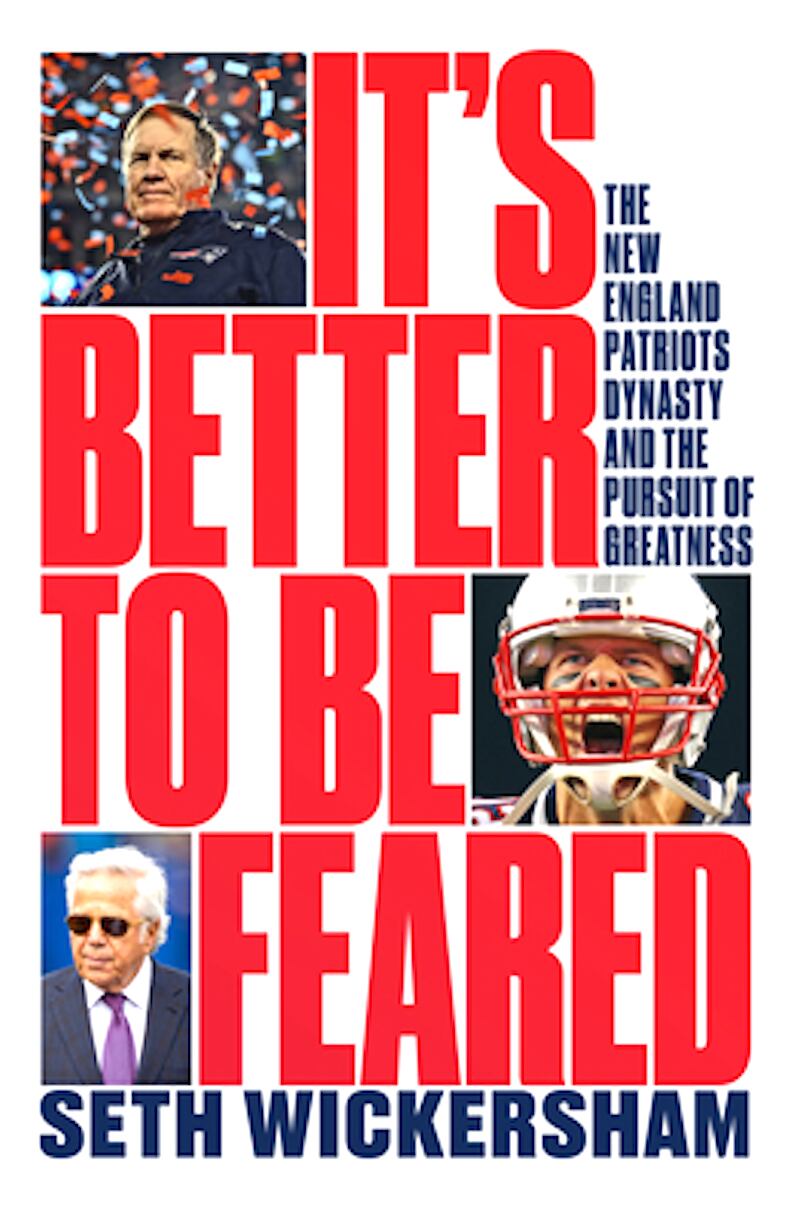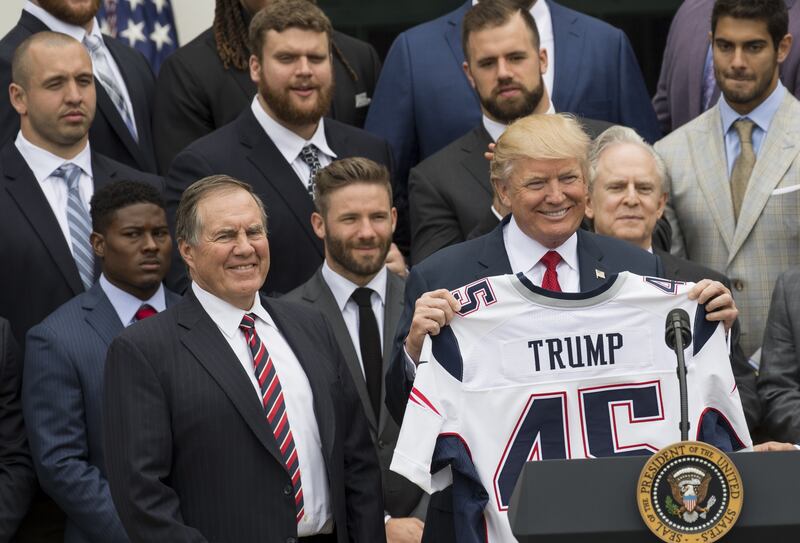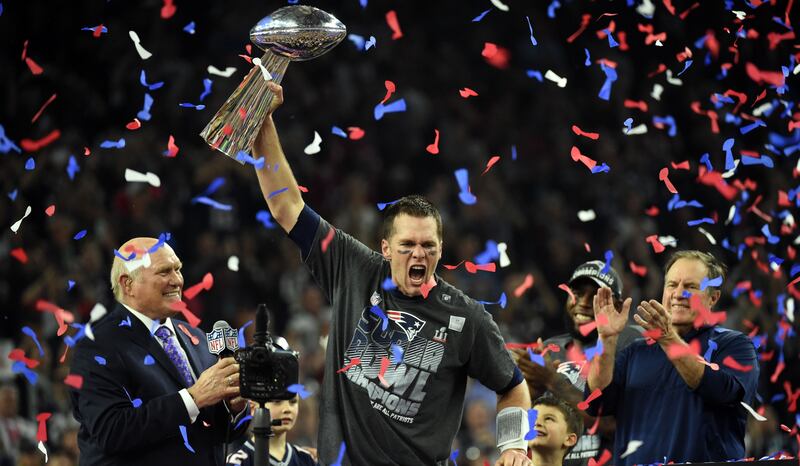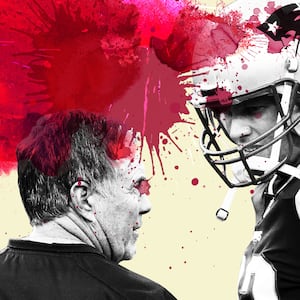It is breathtaking to watch Fox Sports’ prepackaged intro to Super Bowl XXXVI. The NFL, staging America’s Big Game, its first after one of America’s worst tragedies, caked itself in the red, white and blue for the occasion. A montage of players read Kennedy’s “Ask not what your country can do for you...” speech. Former President and CIA Director George H.W. Bush—also the father of the then-president, who was riding a wave of approval like no world leader had ever seen—assisted with the coin toss. Mariah Carey sang the Star-Spangled Banner while perched between two displays: one of soldiers planting the flag at Iwo Jima, the other a real-life evocation of firefighters raising the flag at Ground Zero.
What happened next, of course, was devastating. Two unconscionable, vengeance-fueled wars. A financial crisis that left an entire generation adrift. An inspiring Chicago politician elected to the highest office on a promise to turn everything around, only to be swamped by the machinations of a loathsome Kentucky gremlin. A reality-TV host became president, where he botched a deadly pandemic so badly that everyone had to spend a whole year inside their homes.
The wake of 9/11 looked like America coming together, but really, it sowed the seeds for a miserable era in public life. Super Bowl XXXVI was also the first NFL title for quarterback Tom Brady, head coach Bill Belichick, and the New England Patriots, who would go on to play in nine of the following 19 Super Bowls, winning six of them, and transforming themselves into the greatest NFL dynasty ever. They would also be scandal-ridden and widely loathed by anyone who wasn’t a Patriots fan. For nearly two decades, they were America’s team, for better or worse. (OK, mostly for worse.)
ESPN’s NFL reporter Seth Wickersham has just released a new book about the Brady/Belichick Patriots, It’s Better to be Feared: The New England Patriots Dynasty and the Pursuit of Greatness. It is colossally entertaining—a dishy, fairly comprehensive exposé of the NFL’s culture and the ambition and neuroses that built it.
Although he doesn’t really press on it throughout the book, in the introduction, Wickersham spells out how his narrative parallels with that of the country: “They were defined by many of the things that defined American life during the first two decades of the current century: an embrace of overwork, a refinement of craft to a previously unseen level, empiricism and the love of data, along with the creation and marketing of pseudoscience… and finally, a zero-sum ethos towards victory.”
Wickersham’s approach to this win-at-all-costs problem is fascinating because, as a daily sportswriter, he clearly admires what the Patriots accomplished. He frequently refers to Brady as the greatest quarterback who ever played the game, and he extensively chronicles how Belichick’s meticulous approach was the bedrock of the team’s success. He is charitable about the occasions of extraordinary luck the team exploited on their way to their titles, playing them up as a byproduct of Brady’s winning mindset and Belichick’s obsession with preparedness. In this way, the book is like hundreds of narratives about the team’s success that any bozo sportswriter could put to paper.
But what makes Wickersham’s narrative interesting is how it doesn’t flinch when confronted by Belichick and the Patriots’ lack of ethics.
You’re probably familiar, for instance, with the Pats’ long and storied love affair with cheating. The Patriots just loved cheating. From the second Belichick took that sideline, their organization was doing dirty deeds for dirt cheap as often as they could, with a depth of disregard for fairness that bordered on flair.
Years before the Astros were using live feeds and whacking garbage cans to steal signals, the Patriots would semi-openly send their video staff out to videotape their opponents’ signals during practice, then relay the information they found to their quarterback. They did this for seven years. If they had trouble deciphering the signals, they would sign a player who got cut from their upcoming opponent, and have them run through the tapes to confirm or deny their guesses. Rams coach Mike Martz, among others, was convinced the Patriots taped the Rams’ practices before Super Bowl XXXVI. When the official investigation concluded, Wickersham reports, NFL Commissioner Roger Goodell pressured Martz into issuing a statement that claimed he was “very confident there was no impropriety” and that it was “time to put this situation behind us.” A moment of powerful American unity, stained by the sin of cheating.

The Pats’ predilection for videotaping became something of an open secret, especially after their assistants started to leave the team for greener pastures. In It’s Better to be Feared, Wickersham details the 2007 sting that exposed the Pats’ schemes for good.
On the advice of team leadership, including former Belichick disciple and current coach Eric Mangini, New York Jets security director Steve Yarnell posted up in the stadium, looking for a rat. “Belichick made it easy for him,” writes Wickersham. “The cameraman was Matt Estrella, a young man no different than those who preceded him. He was 26 years old. He was disguised in a red media vest and used tape to cover the New England Patriots logos on his shirt… He was told to alternate between shots of the down and distance, and aiming directly at the opposing team’s defensive coaches as they signaled. He knew, as did his bosses, that what he was doing was a violation of league rules.”
“Toward the end of the first half, Yarnell spotted Estrella, down near the end zone. He alerted NFL Security… Just before halftime, Estrella rushed into the bowels of the stadium, towards the Patriots locker room—and ran right into a waiting Yarnell. He confiscated the camera. And tape, and soon, Estrella found himself in a small room with a few other security officials. Estrella knew he was busted. They asked Estrella who he worked for.
“Kraft Productions,” Estrella replied, deploying one of his excuses.
After this thrilling chase, Goodell, who got the job in part because of the support of Patriots owner Robert Kraft, oversaw an internal investigation, fined the team, and then destroyed the tapes and declared the matter settled.
One person who disagreed: Sen. Arlen Specter, an Eagles fan and the chairman of the Senate Judiciary Committee. He dragged Goodell and others in front of the Senate (Waste of time? Probably!) and demanded answers. He didn’t really end up getting any, save Goodell insisting that the taping was fairly limited (contradicting what Belichick told him) and that no one thought it did much (contradicting pretty much every coach who spoke about the taping publicly.). Eventually, after former Pats employee Matt Walsh, the only connected person who said anything about the taping in public, appeared before the committee and said he didn’t know shit, Specter wrote “cover-up” underneath Walsh’s name in his notes.
(Side note: While this was going on, Donald Trump, a mutual friend of Specter and Robert Kraft, told the senator that if he “laid off the Patriots, there’d be a lot of money in Palm Beach.” Trump claimed he was acting as a go-between for Kraft, who denies this. Specter looked into if this was a bribe, and decided it wasn’t.)
But hey, they didn’t just film people. They also stole play sheets from the opposing locker rooms and had low-level coaching staff rummage through trash cans to find scouting material that might have been useful in the future. Teams would often report trouble with their in-game headsets when playing at New England’s Gillette Stadium, leading many to speculate that the organization might be messing with the radio signal. Belichick would even employ questionable in-game tactics after clandestinely checking with the league to make sure he could get away with his little Sunday schemes. The Patriots operated on an island, floating above the concerns of fair play, like gifted boys kicking sand in the faces of the other kids they’ve been forced to attend camp with.

President Donald Trump holds a jersey given to him by New England Patriots head coach Bill Belichick alongside members of the team during a ceremony honoring them as 2017 Super Bowl Champions on the South Lawn of the White House in Washington, D.C., April 19, 2017.
Saul Loeb/AFP/GettyWhile all this was going on, another deeply amoral patriarch was engaging in scale-tipping: Vice President Dick Cheney. Exploiting the very sort of national unity that we all felt when Mariah Carey hit that screechy high note right as Tom Brady prepared to take his first steps into the Hall of Legends, the Bush administration gutted the right to privacy, employed widespread warrantless wiretapping, manufactured absurd evidence to trick the country into fighting a brutal and chaotic war in Iraq, wiped their asses with the Geneva convention, and just generally went hog-wild in the name of security. It was a jarring, deeply cynical time.
Belichick was on the vibration of the times. Wickersham’s book skips past Belichick’s work habits and abusive managerial style the way The Last Dance side-steps Jordan’s capacity for pettiness. It makes them great, it makes them miserable, it makes other people miserable. He’s football’s Bezos: psychotic drive, massive vision, complete disregard for human comfort, be it his own or anyone else’s.
Bill wasn’t the only Patriot getting his hands dirty. Tom Brady took a four-game suspension when he was caught conspiring with equipment managers to deflate footballs and improve his grip, a relatively minor scandal that has come to be known as “Deflategate.” But if Belichick was a curious analog for one disaster in American life, Brady’s later career with the Pats resembles another current that came to sweep American life: The Grift.

Tom Brady of the New England Patriots holds the Vince Lombardi Trophy as head coach Bill Belichick looks on after defeating the Atlanta Falcons 34-28 in overtime during Super Bowl 51 at NRG Stadium on February 5, 2017, in Houston, Texas.
Timothy A. Clary/AFP/GettyAs Brady aged, he became obsessed with staving off the end of his career. Alex Guerrero, an alternative medicine guru who has spent some time in hot water with the FTC, attached himself to Brady. “His philosophy was different than that of the Patriots’ doctors—and all of western medicine,” writes Wickersham. “It was a holistic approach based on massage and hydration and diet, and it appealed to the fragility deep inside Brady that he had always found a way to transmute into confidence.”
After employing Guerrero as a trainer and sort of guru for several years, he and Brady started a wellness-esque training company, TB12, which marketed a bunch of ascientific training and nutrition theories to the public and the New England Patriots, who contracted the company in a deal that some people suspected was a kind of salary-cap workaround. Over time, the team began to feel that Guerrero’s methods might have made some players on the team more injury-prone. When the Patriots phased Guerrero and the nearby TB12 Sports Therapy Center out of the team’s training mix, the developing rift between Brady and Belichick became a chasm.
In 2020, Brady left for Tampa Bay, where he immediately won another Super Bowl—his seventh, more than any single organization in the history of the NFL. Wickersham writes: “Brady has cycled to an emotional place from which he insisted, both publicly and privately, that his departure wasn’t rooted in acrimony. He wasn’t angry with anyone, he told friends. He believed he was parting on good terms. That was important. He no longer wanted to be a robotic soldier, the embodiment of an oppressive culture that he’d helped to create and had now lost faith in. He was free to be himself, and he saw his true self as ready to find out if there was another way to win outside of Belichick’s methods… a few days after he signed with his new team, he wrote an essay for The Players Tribune, focused on beginning and endings. He thanked Kraft by name. He didn’t thank Belichick.”
When Brady signed with Tampa Bay, the team brought Guerrero along as well. Brady freed himself from the strictures of Belichick’s domineering, amoral vision of victory, sure. But he just ended up stumbling into a different, stranger vision—a paranoid minefield of anti-science flimflam, not so dissimilar from the thinking that ensured America would be sucked into an ongoing COVID vortex. For all his success, Tom Brady just can’t seem to escape America’s worst impulses.






